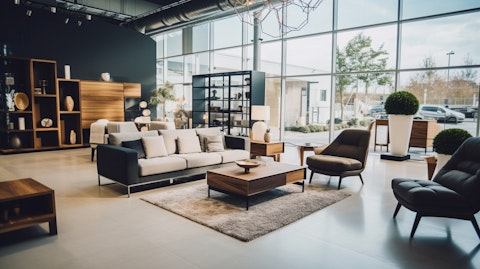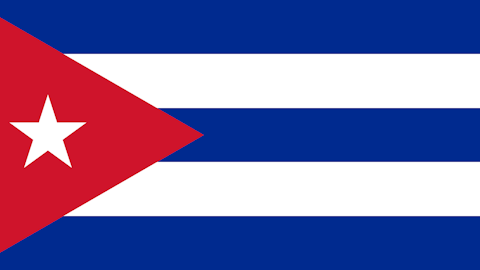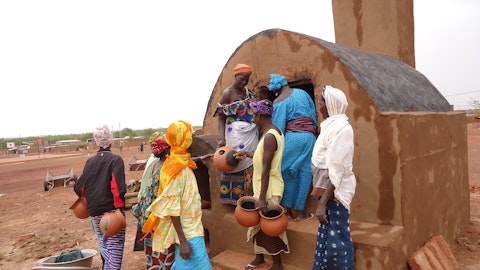Hooker Furnishings Corporation (NASDAQ:HOFT) Q2 2025 Earnings Call Transcript September 5, 2024
Hooker Furnishings Corporation misses on earnings expectations. Reported EPS is $-0.19 EPS, expectations were $-0.13.
Operator: Good day, and thank you for standing by. Welcome to the Hooker Furnishings Corp. Second Quarter 2025 Earnings Webcast [Operator Instructions]. Please be advised that today’s conference is being recorded. I would now like to hand the conference over to your speaker today, Paul Huckfeldt, Chief Financial Officer. Please go ahead.
Paul Huckfeldt: Thank you, Dan. Good morning. And welcome to our quarterly conference call to review financial results for the fiscal 2025 second quarter, which began April 29th and ended July 28th, 2024. Joining me this morning is Jeremy Hoff, our Chief Executive Officer. We appreciate your participation today. During our call, we may make forward-looking statements, which are subject to risks and uncertainties. A discussion of factors that could cause our actual results to differ materially from management’s expectations is contained in our press release and SEC filing announcing our fiscal 2025 and second quarter results. Any forward-looking statement speaks only as of today and we undertake no obligation to update or revise any forward-looking statements to reflect events or circumstances after today’s call.
Despite persistent weak market conditions, sales in the second quarter, typically our slowest quarter, outperformed the first quarter. This morning, we reported consolidated net sales of $95 million for the fiscal 2025 second quarter, a decrease of $2.7 million or 2.8% as compared to the last year’s second quarter. The low single digit sales decrease was a solid sequential improvement from last quarter’s double digit sales reduction. Net sales decreased by $2.3 million at domestic upholstery and $1.6 million at Hooker branded, while Home Meridian saw an increase of $1.6 million, driven by strong sales in its hospitality business, which more than offset the loss of $3.5 million of liquidation sales from the unprofitable ACH product line we exited last year.
We recorded a consolidated operating loss of $3.1 million and a net loss of $2 million or $0.19 per diluted share. Both operating and net losses improved compared to the first quarter’s losses of $5.2 million and $4.1 million respectively. During the fiscal 2025 six month period, consolidated net sales decreased by $31 million or 14% compared to the same period last year, also due to persistent low demand for home furnishings driven by macroeconomic uncertainties. The absence of $11 million in revenue from the ACH product line accounted for approximately 35% of the sales decrease. We recorded a consolidated operating loss of $8.2 million and a net loss of $6 million or $0.57 per diluted share for the first half. Now I’ll turn the call over to Jeremy to comment on our fiscal 2025 second quarter results.
Jeremy Hoff: Thank you, Paul. And good morning, everyone. Challenges in the macroeconomic and furniture retail environment have extended well beyond our expectations. The combination of high interest rates, a housing shortage and elevated home prices have created a sustained housing downturn for over two years. While retail sales are doing well overall, furniture retail is not. In response, we continue to focus on the things we can control to ensure we’re in the best possible position to grow when the macro environment improves. As we announced last quarter, we have begun a cost reduction plan aimed at reducing fixed costs by 10% for a total of $10 million in annualized savings. As of now, we expect to exceed that target. Approximately $5 million in savings is expected to be realized this fiscal year split between the third and fourth quarters.
In our cost reduction measures, we are focused on reducing non-strategic costs while continuing to invest in revenue and profit generating initiatives. Reductions will come from the consolidation of certain operations and fixed cost reductions, including reducing the company’s Savannah warehouse footprint by half and restructuring the BOBO business into the Hooker branded business, eliminating BOBO’s retail store and separate warehouse among other measures. In addition, the company just completed an early retirement offer to qualifying employees and just yesterday, further reduced our workforce for an annualized savings of almost $6 million. We expect to record $3 million of severance expenses in our fiscal ‘25 third quarter. While we continue to focus on our growth, in April, industry veteran Caroline Hipple joined us in the new position of Chief Creative Officer to lead a re-merchandising of Hooker Legacy Brands, which aims to position the company as a more integrated whole home consumer centric resource with an elevated aesthetic and presentation.
While early in this shift in our merchandising strategy, we have had a very positive reaction from customers and previews of new products targeted for the next High Point Market. Our partners’ positive feedback has given us the confidence to place initial cuttings prior to the October High Point Market launch. Essentially, this gives us a three month head start on selling these products. The increased speed to market mentality helps strengthen our assortment for next year. We remain confident that the strategies we are pursuing in operations, marketing and merchandising are transformative. Extended downturns present opportunities to recalibrate and reinvent aspects of our business. Now I want to turn the discussion over to Paul, who will discuss highlights in each of our segments.
Paul Huckfeldt: Thanks, Jeremy. The Hooker branded segment net sales decreased by $1.6 million or 4.5% in the second quarter compared to the prior period, primarily due to lower average selling prices following price reductions implemented in the second half of last year, driven by reduced ocean freight costs. Unit volume, however, exceeded the prior year second quarter by 11% and improved compared to the first quarter. Quarter end order backlog remains 20% higher than pre-pandemic levels at the end of the fiscal 2020 second quarter. For the current six month period, net sales decreased $9.7 million or 12%, driven by the same decrease in average selling prices and to a lesser extent, decreased unit volume in the first quarter, reflecting the ongoing industry headwinds.
Moving on to the Home Meridian segment. We saw several improvements. HMI net sales increased by $1.6 million or 5.6% in the second quarter, primarily driven by strong performance in the hospitality division. This marks the first year-over-year quarterly sales increase in two years for this segment. Additionally, sales through major furniture chains and mass merchants increased during the quarter. These gains were partially offset by decreases in sales to independent furniture stores and through the e-commerce channel. The quarter end backlog was 2% higher than the same period last year and 22% higher than the fiscal 2024 year end back in January. Home Meridian reported an increase in gross profit achieving a gross margin of 19.5%, one of the highest levels since the acquisition of that business in 2016.

The quarterly operating loss was below $1 million, which was an improvement from the $3.4 million loss in the first quarter and the $3.3 million loss in the prior year same period. We believe we’ve reached the point at HMI where we have a significant path to profitability that is sustainable for the foreseeable future once demand normalizes for the home furnishings industry. For current six month period, net sales decreased by $13.9 million or 19% at HMI largely due to the absence of $11 million of ACH liquidation sales. The remaining decrease was attributable to lower sales through independent furniture stores and e-commerce, while partially offset by increased sales in the hospitality business. Domestic upholstery segment net sales decreased by $2.3 million or 7.6% in the second quarter, primarily due to lower unit volumes of Bradington Young and HF Custom.
Sunset West and Shenandoah each reported single digit sales increases. Industry weakness continues to affect order rates and backlog levels leading to reduced production at Bradington Young and HF Custom for this quarter. On a more positive note, excluding Sunset West, the order backlog remains 20% higher than pre-pandemic levels at the end of fiscal 2020 second quarter. Sunset West’s net sales increased during the quarter following a 20% increase in revenues last quarter. Now that we’ve repositioned Sunset West from a West Coast centric distribution and supply chain to a bicoastal operation, the division is hitting its stride and we believe it will be a key area for growth for our company. Approximately 50% of demand is now coming from the East Coast, a trend that we believe will continue to grow.
For the six month period, net sales in this segment decreased by $7.4 million or 11% with Bradington Young, HF Custom and Shenandoah, all experiencing sales decreases while Sunset West reported a 10.7% sales increase. Moving now to cash debt, inventory. Cash and cash equivalents were $42.1 million at the end of the second quarter, down $1.1 million from the fiscal year end but up $1.2 million from the first quarter, which ended back in April. Inventory levels decreased by $4.7 million during — from year end. During the six month period, we used cash and cash equivalents on hand as well as $5.3 million of cash generated from operating activities to fund $4.9 million in cash dividends, $2.4 million to further develop our cloud based ERP system and $1.4 million of capital expenditures.
In addition to our cash balance, we had an aggregate of $28 million available under our existing revolver at quarter end to fund our working capital needs, as well as $29.4 million of cash surrender value of company owned life insurance. Focused inventory management and capital expenditures as well as diligent expense management, we believe we have sufficient financial resources to support our business operations and continue our 50 plus year history of paying quarterly dividends for the foreseeable future. We’re in the process of refinancing our credit facility and expect to have that completed in the near future. In addition, we plan to pay off $22 million of term debt during the third quarter, demonstrating our confidence in our company’s future.
Now I’ll turn the discussion back to Jeremy for his outlook.
Jeremy Hoff: Thank you, Paul. We are encouraged that inflation hit its lowest post pandemic level in July with the consumer price index cooling to 2.9%, setting up a possible interest rate cut in September. There’s been a recent surge in mortgage refinancing in August, which is another positive indicator as consumers benefit from higher monthly disposable income from lower monthly payments on credit cards, homes and cars. We believe that if the interest rates are lowered housing activity will accelerate. While the US Department of Commerce reported its 17th consecutive month of lower home furnishings retail sales in July, overall retail sales rose about 3% during the same period and the University of Michigan Consumer Sentiment Index rose in August for the first time since March.
Additionally, existing home sales grew in July, ending a four month sales decline. Our strong balance sheet, financial condition and seasoned management team will allow us to navigate the remaining downturn as we focus on maximizing efficiencies with the planned cost reductions. We’ll continue investing in expansion strategies that will position us for improved profitability and revenue growth when demand returns. This ends the formal part of our discussion. And at this time, I will turn the call back over to our operator, Daniel, for questions.
Operator: [Operator Instructions] Our first question comes from Anthony Lebiedzinski with Sidoti.
Anthony Lebiedzinski: Thank you for taking the questions, and certainly nice to see these sequential improvements and the continued strong balance sheet. So first, can you guys just comment on the monthly progression of shipments and orders that you saw during the quarter?
Q&A Session
Follow Hooker Furnishings Corp (NASDAQ:HOFT)
Follow Hooker Furnishings Corp (NASDAQ:HOFT)
Receive real-time insider trading and news alerts
Paul Huckfeldt: It’s pretty steady throughout the quarter. I would say business is still got a lot to recover and I think we’re sort of bouncing along. I think that’s true both of orders and shipments at this point.
Anthony Lebiedzinski: And just wondering if you guys saw any notable regional or geographic differences in terms of your sales patterns?
Jeremy Hoff: Not really. I mean, it’s interesting because more times than not you would see that, but it seems to be, what I’ll call, kind of equally tough everywhere. It’s not as regional as you would usually see it is how I would describe it right now.
Anthony Lebiedzinski: And Jeremy, you said earlier that you guys expect to exceed the target for cost cuts of the $10 million. So can you expand on that? And I don’t know if there’s any — I don’t know if you’re prepared to share any additional numbers. But if you could just — where are you finding opportunities to further streamline the business?
Jeremy Hoff: Well, our first objective when we started the exercise and announced to public that we were doing this is we went to really every cost center that we have throughout the company and tried to find any non-personnel, non-strategic cost that we could eliminate to reach as much savings as possible that was non-personnel related. Once we were through that exercise, we of course went to the personnel as well. And again, even with the personnel, we were very focused on making sure we weren’t eliminating strategic cost in order to be able to execute our organic growth strategy that’s in place. I know I’m not specifically answering your question. But I will tell you, when we say we’re confident we will surpass the $10 million, we are very confident we will surpass the $10 million.
Anthony Lebiedzinski: And then as far as HMI, certainly, a nice gross margin there 19.5%. And this is still obviously a tough operating environment. So when the business does improve, what would be a reasonable margin or gross margin that is for HMI you think once business recovers?
Jeremy Hoff: Paul and I believe 20 would be a reasonable mark for or goal for HMI. And it’s just a stress, we haven’t raised prices. We’ve simply been able to exit businesses that we’re dragging that overall margin down. So that’s really given us the opportunity we have to improve that number.
Paul Huckfeldt: And there’s been a focus on making sure that the margins — the margins on the programs that we have are right. So now it’s a matter of just growing sales — the SG&A leverage is where the profitability will come.
Anthony Lebiedzinski: And then my last question before I pass it on to others. So the Labor Day obviously is a big holiday for the home furniture sector. I certainly realize that we’re only a few days away from the holiday. But just wondering what are you hearing from your retail partners coming out of the holiday in terms of what traffic or order patterns or anything like that? If you could share that’d be great.
Jeremy Hoff: As far as from our retailers, we heard it was a reasonably good holiday. They were obviously needed it after a tough summer from a little more tangible but not very long trend standpoint. Our order rate’s been pretty good, actually really good right after the holiday weekend, which tells me that it did — we did pretty well. So as an industry better than we’ve been doing. So that’s a good sign, even though it’s a pretty short, it’s not really a trend yet.
Operator: [Operator Instructions] Our next question comes from Dave Storms with Stonegate.
Dave Storms: When thinking about the outlook and maybe just the situation of the remaining downturn. Are there any green shoots that we should be taking a look at? It seems like backlog is remaining fairly stable, volumes are coming up in branded, sequential gross margin increases. Anything else that you’re kind of keeping your eye on that we should think about, call it for the next two to four quarters?
Jeremy Hoff: We’ve talked about, we keep — our focus is solely on how we get better, how we make sure our product line is at the right level, meaning good enough for our customers and can we ship quickly, can we achieve the speed to market we want to. So all those factors for us we think will improve our backlog as the year progresses. And one of our goals is to try to get the backlog as strong as we can going towards the last part of this year with really a high focus on the October market and trying to maximize that opportunity as much as we can, which would help the backlog.
Paul Huckfeldt: And our move to pre-cut multiple collections, we’re trying to lead into a strong market with having product available so that we can try to jump start into the New Year, I think, so that’s what we’re looking for is incoming orders and backlog right now.
Jeremy Hoff: And we don’t pre-cut without understanding what our significant part of our customer base feels about the product. So that’s been a lot of work to get out there and see our customers and understand where we are from a product level to be able to make that decision.
Dave Storms: And then just turning to the income statement. It looked like a pretty sizable jump in other income. Is there any more color you could give us on what caused that jump both sequentially and year-over-year?
Paul Huckfeldt: The biggest item is reversing an accrual for a potential earn out on an acquisition, that was about half of that increase, that would be a non-recurring item. And I guess also point out that our tax rate’s a little weird this quarter, because of our profitability and the impact of permanent differences on our tax rate. I would not use the current tax rate in any kind of forecasting to do. I’d go back to a more normal, like a 23% normalized tax rate while we’re talking about that part of the income statement.
Dave Storms: And then just one more from me with regards to the cost savings. Do you anticipate any corollary reduction in maintenance CapEx spending to go along with these cost savings?
Paul Huckfeldt: We took another look at our capital budget for the year. And yes, we’re deferring a fairly significant amount of CapEx. I think most of the — the growth initiatives that Jeremy talks about are people and product related and not capital expense intensive. So yes, we’re pulling back on our capital spending to try to preserve cash. As we see the economic conditions change, we’ll reevaluate that. And I think we’re deferring, we’re not canceling projects, but right now we’re deferring them.
Operator: Thank you. I’m showing no further questions at this time. I would now like to turn it back to Jeremy Hoff for closing remarks.
Jeremy Hoff: I would like to thank everyone on the call for their interest in Hooker Furnishings. We look forward to sharing our fiscal ‘25 third quarter results in December. Take care.
Operator: This concludes today’s conference call. Thank you for participating. You may now disconnect.
Follow Hooker Furnishings Corp (NASDAQ:HOFT)
Follow Hooker Furnishings Corp (NASDAQ:HOFT)
Receive real-time insider trading and news alerts





